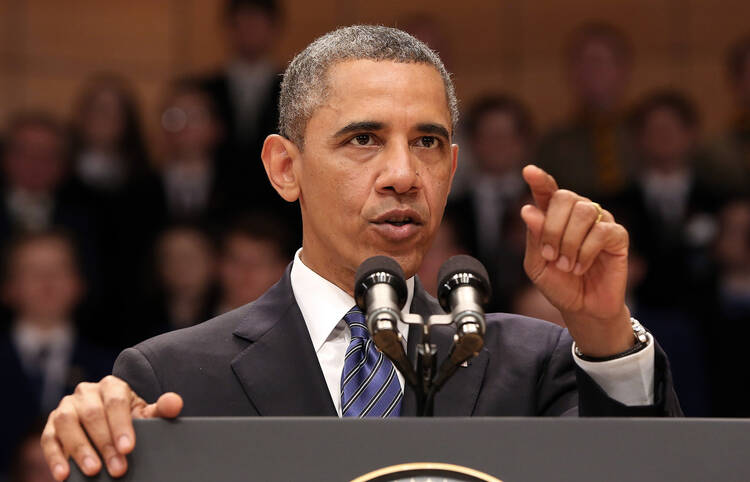About a month ago, in a speech he called “My Brother’s Keeper,” President Barack Obama called upon the American people—business, industry, educational institutions and non-profit foundations in particular—to face up to the scandalous condition of young men of color.
To put it bluntly, the opportunities for a young African American or Hispanic man today to finish high school, go to college, get a good job, marry and stay married to one woman, raise a family and send children to college while the grandparents settle down and beam with pride as the next generation prospers, are slim.
Meanwhile chances that the young black man will drop out of high school, join a gang, sell pot or heroin, get arrested and sent to jail, rejoin the gang when he gets out, get his girl friend pregnant, fail to support his children and get shot dead in a gang war are much higher than they should be.
“We just assume this is an inevitable part of American life, instead of the outrage it is,” President Obama said of the situation of young men of color. “It’s like a cultural backdrop for us in movies, in television. We just assume, of course it’s going to be like that.... These statistics should break our hearts, and they should compel us to act.”
My immediate reaction was “Where have you been and why didn’t you say this in your first Inaugural Address?
Gary Younge, the black columnist for The Guardian Weekly (Feb. 23) poured out his disappointment in Obama’s failure to lead, contrasting him with the Lyndon Johnson portrayed in Robert Caro’s Path to Power, who when warned right after Kennedy’s assassination that there was no chance of passing the civil rights legislation, replied, “Well, what the hell’s the presidency for?” Obama’s second term has, Younge says, been marked by drift in principle and policy.
I can sympathize with Obama’s reluctance--conscious that as the first black president his foes were looking for any evidence that he favors “his own people,”--to come on like a cavalry charge with a list of programs: expand voting rights, scholarships to guarantee every poor person a college education, building projects that would employ jobless black men and break them out of the crime-filled ghettos in which they were trapped.
The president had other priorities, like health care, delivered in his signature legislation, the Affordable Care Act. Yes, we know that the initial enrollment process was a computer screw-up; but, whatever its shortcomings, so far almost 5 million people have signed on, mostly people who may not have had any health insurance before. And much of the opposition to the program has been driven by groups who for partisan reasons just can’t bear to see Obama succeed.
Peter Ubel, M.D., (KevinMD.com) reports that the people most likely to benefit from this law are blacks and Hispanics who lack both insurance and needed medical care. Indeed one of the major goals of Obamacare was to reduce unjust disparities in health care and free the sick to pursue meaningful lives. People who are disturbed by the idea of creating a new “entitlement,” who think people are poor because they are lazy, who see good health as an earned privilege rather than a human right, will delight in a chance to make Obama look stupid. Rep. John Lewis says it well: today’s opponents to Obamacare remind him of those who opposed the march for civil rights in the 1950s. This law is here to stay. Attempting (40 times) to repeal the act, members of Congress “closed down the government and threatened the economy for the United States, costing us more than $24 billion,” Lewis said.
Another Point of View
These things having been said, economic columnist Eduardo Porter (The New York Times, Mar. 5) approaches the broken family issue from another angle than the alarm call on the disintegration of the black family issued by Daniel Patrick Moynihan 50 years ago. Obama himself echoed Moynihan in 2007 when he said that “there are a lot of men out there who have to stop behaving like boys, who need to realize that the responsibility does not end at conception, who need to know that what makes a man is not the ability to have a child but the courage to raise one.” The campaign to save traditional marriage by beating on the dead-beat dads has not worked.
But today the problem has broadened: 36 percent of white children are born to single mothers, as are 53 percent of Hispanics; among blacks the number is 72 percent. This is no longer a “black” problem but a poor people’s problem. With this in mind the White House has proposed to expand the earned-income tax credit, which supplements the incomes of millions of poor parents—to include workers who do not care for children. This includes absent fathers. Part of the absent father problem is that they have been subjected to wage garnishment (court-ordered salary deductions for child support), but they can’t pay debts when they are jobless and jailed. Over half the young black males in prison have young children. When they get out they will still owe the payments and they won’t have jobs.
Yes, this is a sign of moral decline; but the job market has changed so much that many men can’t fulfill their marriage obligation. They are, in a realistic sense, unmarriageable. So, Obama’s pep talk to the “My Brother’s Keeper” congregation is both valid and, like some other aspects of his presidency, good, but not enough. The whole American family must make the sacrifices, raise and pay the taxes, to lift up those sons and brothers who are unemployed.








